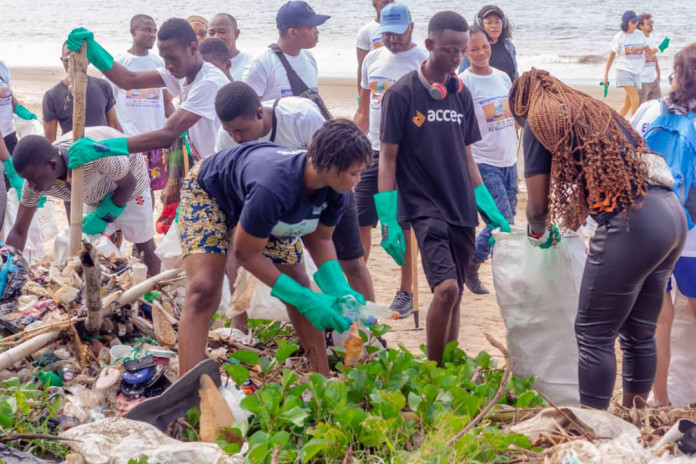By Foday Moriba Conteh
The European Union Delegation to Sierra Leone, in collaboration with the Ministry of Tourism and Cultural Affairs, the National Tourist Board, and the Freetown City Council, successfully organized the 7th edition of the “EU Beach Clean-Up Day” at Lumley Beach on Saturday, October 26, 2024. This initiative is part of the EU’s global commitment to raising awareness about the pressing need to protect the environment and eliminate plastic pollution from oceans.
The event attracted a diverse group of participants, including government officials, civil society representatives, members of the diplomatic corps, business leaders, students, and dedicated volunteers from across the nation. Over 750 volunteers collected approximately 1,500 kilograms of plastic waste and various types of litter along the Lumley-Aberdeen beach stretch, showcasing the impact of collective action.
Freetown Mayor Yvonne Aki-Sawyerr commended the initiative, stating, “Our oceans are vital to our planet, providing air, supporting biodiversity, and sustaining communities. Unfortunately, they are threatened by plastic waste. We must adopt sustainable practices and improve waste management to protect our oceans. The Freetown City Council is proud to partner with the EU each year in this beach clean-up initiative, raising awareness of the necessity for a clean and healthy city.”
Sierra Leone’s Minister of Tourism and Culture, Nabeela Tunis, expressed gratitude upon receiving tools donated to enhance ongoing clean-up efforts. She noted, “The partnership between the EU and the Ministry of Tourism and Cultural Affairs, along with the National Tourist Board, spans over a decade. The donated tools will augment previous contributions from the EU, assisting beach combers in their routine cleaning efforts.”
EU Ambassador to Sierra Leone Jacek Jankowski reiterated the EU’s commitment to environmental sustainability, emphasizing, “Every minute, a truckload of plastic waste is dumped into our oceans, endangering marine life and ecosystems. If we fail to act now, these impacts will extend to our health and well-being. The EU is dedicated to collaborating with Sierra Leone to address this crisis through events like today’s, alongside sustainable development projects aimed at environmental protection.”
Ambassador Jankowski highlighted the shared responsibility of maintaining the natural beauty of Freetown’s coastline, stating, “Today’s clean-up serves as a reminder that collective action is essential to protect our environment, ensuring our beaches, marine life, and ecosystems thrive for future generations. The EU stands with Sierra Leone in this fight for sustainability.”
The EU and its member states continue to bolster Sierra Leone’s environmental protection initiatives, with a focus on a Green Economy within the Development Partnership and Multiannual Indicative Programme for 2021-2027. Notably, the EU has allocated nearly €9 million toward mangrove restoration in areas such as Yawry Bay and the Sherbro Estuary, contributing to coastal resilience and promoting sustainable practices for local communities.
Sierra Leone grapples with severe environmental challenges, including plastic pollution, mangrove degradation, and beach litter, exacerbated by inadequate waste management and the prevalent use of single-use plastics (SUPs). The country generates approximately 130,000 tonnes of plastic waste annually, with only six percent recycled. This waste significantly contributes to the global plastic pollution crisis, threatening marine life and the economy.
With mangroves covering roughly 170,000 to 180,000 hectares along Sierra Leone’s coastline, they play a crucial role in preventing erosion, supporting fisheries, and acting as carbon sinks. However, land conversion for development has led to a loss of over 40 percent of mangrove cover since the 1980s. Coastal communities’ reliance on mangrove wood for smoking fish further exacerbates this problem.
The EU’s initiatives aim to restore mangroves, enhance coastal resilience, and support local communities while promoting sustainable practices. By advocating for stringent actions to tackle plastic pollution, the EU calls for a comprehensive lifecycle approach to plastics, emphasizing the need for global criteria and rules for sustainable product design.
As part of its ongoing efforts, the EU continues to mobilize resources through bilateral, regional, and global programs to support partners in fulfilling the Global Biodiversity Framework.






